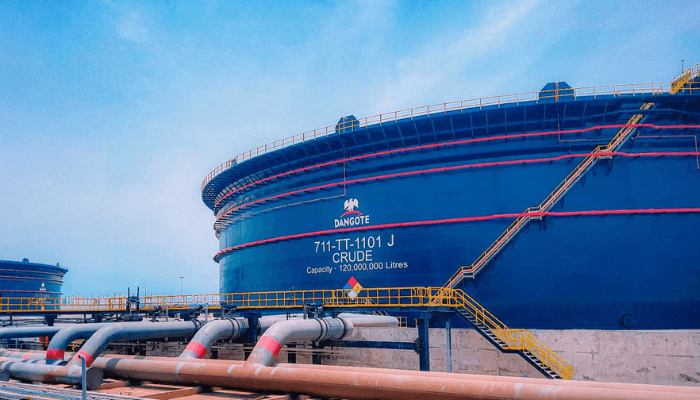In a significant milestone for Nigeria’s energy sector, the Dangote Petroleum Refinery began supplying premium motor spirit (PMS) to filling stations nationwide on Sunday. This marks the first time in nearly three decades that a substantial portion of Nigeria’s PMS needs will be met domestically. The refinery, built by Nigerian billionaire Aliko Dangote, has started producing petrol after overcoming initial disagreements over pricing and off-take rights.
The $20 billion refinery, located in Lekki, Lagos, is expected to alleviate Nigeria’s long-standing fuel shortages. Despite being Africa’s largest oil producer, Nigeria has struggled to refine its own crude, relying on imports to meet demand due to the failure of its four state-owned refineries. The start of production at the Dangote Refinery is seen as a turning point, particularly after nearly two months of PMS scarcity in the country.
NNPC Secures Supply at N898/Litre
The Nigerian National Petroleum Corporation (NNPC) revealed that it purchased petrol from the Dangote Refinery at a price of N898 per litre. This announcement comes amidst debates over the pricing and availability of fuel in Nigeria. While NNPC continues to import 15 million litres of petrol daily to meet the country’s estimated demand of 40-50 million litres per day, the refinery’s production is expected to cover a significant portion of local needs.
Olufemi Soneye, an NNPC spokesperson, clarified that the initial loading price of N898 per litre had been set after claims surfaced that the rate would be N760 per litre. NNPC will remain the sole off-taker of petrol from the Dangote Refinery, while other fuel products like diesel will be made available to interested buyers in the domestic market.
Ambitious Sea Transportation Plans
Devakumar Edwin, CEO of Dangote Refinery, shared plans to transition to sea transport for fuel distribution, optimizing logistics and reducing costs. Currently, the refinery is equipped with 86 gantries capable of loading 86 trucks at once, but the company intends to rely more on maritime transport in the future. According to Edwin, 75% of production can already be transported by sea, and the goal is to increase this to 100%.
This shift is expected to further drive down costs for consumers, as sea transport is generally more cost-effective than road logistics. By utilizing its facilities for both export and domestic distribution, the refinery aims to become a key player in the global and local fuel markets.
Impact on Pricing and Market Competition
While the start of domestic refining is expected to ease fuel scarcity, there are still questions about pricing. The Independent Petroleum Marketers Association of Nigeria (IPMAN) has expressed concerns over the price NNPC is paying for petrol, suggesting that direct sales to marketers could help reduce consumer costs.
Chinedu Ukadike, national publicity secretary of IPMAN, stated that while NNPC has the right of first refusal as a major investor in the refinery, allowing direct sales to marketers would eliminate distribution inefficiencies and lower prices for consumers.
Energy expert Chinedu Onyegbula noted that while the Dangote Refinery’s entry into the market should lead to a reduction in PMS prices, challenges remain. These include managing the logistics of distributing refined products and overcoming resistance from marketers who feel the price is still too high.
Crude Supply and Production Updates
Since December 2023, NNPC has supplied 48.6 million barrels of crude oil to the Dangote Refinery. The highest volume, 5.1 million barrels, was delivered in June and July 2024. With an additional 11.7 million barrels expected to be supplied in October 2024, the refinery is gearing up to meet its production targets and solidify its role in stabilizing Nigeria’s fuel market.
Global Implications and European Refinery Closures
The Dangote Refinery’s commencement comes at a time when some European refineries are struggling to remain competitive. Grangemouth, Scotland’s only crude processing facility, is set to cease operations by the second quarter of 2025, citing competition from newer, more advanced refineries in regions like Asia, Africa, and the Middle East. Owned by Petroineos, the refinery has been unable to compete with the massive capacities and efficiencies offered by complexes like Dangote’s.
The closure of Grangemouth will lead to 400 job losses and a shift to a finished fuels import terminal, reflecting a broader trend in the global oil industry where older refineries are being phased out in favor of more advanced facilities.
As the Dangote Refinery ramps up production, its impact will not only be felt in Nigeria but also in the broader global oil market. With the capacity to meet a significant portion of Nigeria’s domestic fuel needs and export to other regions, the refinery is poised to become a major player in the international refining sector.













